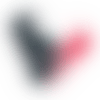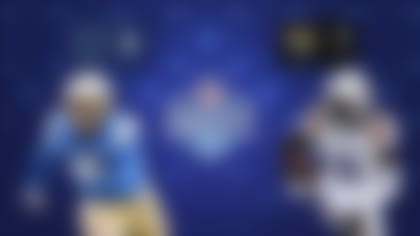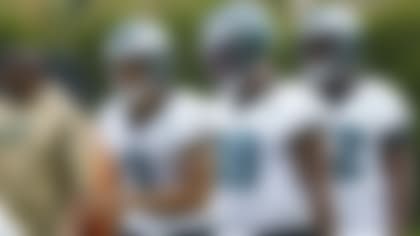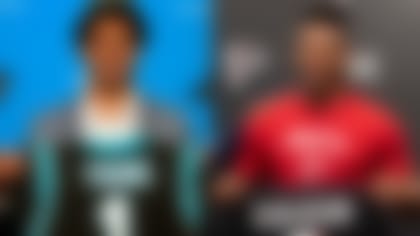Why provide instant grades on the selections of prospects who have yet to take an NFL snap? Well, you're reading this, aren't you? Considering the makeup of every roster and the factors surrounding each pick, Eric Edholm executes a division-by-division assessment of the 2023 NFL Draft. Keep in mind that these grades are based on draft hauls alone -- picks traded for veteran players were not taken into account. Below is the AFC South report card.
Round 1
- Ohio State QB C.J. Stroud (No. 2 overall)
- Alabama edge Will Anderson Jr. (No. 3)
Round 2
- Penn State C Juice Scruggs (No. 62)
Round 3
- Houston WR Tank Dell (No. 69)
Round 4
- TCU edge Dylan Horton (No. 109)
Round 5
- Alabama LB Henry To'oTo'o (No. 167)
Round 6
- Notre Dame C Jarrett Patterson (No. 201)
- Iowa State WR Xavier Hutchinson (No. 205)
Round 7
- Pittsburgh S Brandon Hill (No. 248)
Although it cost them a pretty penny to do so, the Texans landed two of my top three players in the 2023 NFL Draft. I had C.J. Stroud ever so slightly ranked ahead of Bryce Young as the QB1. While part of that is because of Young's tiny build, I also believe Stroud can eventually be a top-12 quarterback in the league with his smart, savvy approach. He could be a strong fit in the Shanahan-influenced offense brought in by new Texans OC Bobby Slowik, and there might be room for Stroud to expand his game with moving pockets and a handful of running opportunities per game. On a team without a ton of elite separators, Stroud's touch and placement will be crucial. Will Anderson Jr. was dinged a bit for his lack of elite size and occasional penchant for sloppiness (penalties and missed tackles), but at his best, he's a Khalil Mack-style game-influencer. Anderson can scream off the edge thanks to elite get-off and close fast with a great internal GPS system. He can be a star in the hands of DeMeco Ryans and Matt Burke, able to rush inside and out, drop in coverage and defend the run. Houston doubled up at center with Juice Scruggs (Round 2) and Jarrett Patterson (Round 6), and based on where they got them, I see Patterson as the better value. Both have good football IQ and versatility to play guard, so there was sense behind the picks, as the O-line still needed padding. Stroud apparently told the Texans he wanted Tank Dell, and I can't wait to see how the diminutive demon is unleashed. He was a wicked cover in college with his stop-start agility and low center of gravity, working mostly out of the slot. The final offensive pick, Xavier Hutchinson, profiles similarly to Jakobi Meyers and could be a security blanket for Stroud. The Texans had three Day 3 selections on the defensive side, one at each level. Dylan Horton adds youth to an experienced defensive line, as well as the ability to rush the passer from multiple techniques. The undersized Henry To'oTo'o continued the run on Alabama players to Houston, bringing green-dot-caliber instincts and smarts to the LB crew -- and also special teams, for that matter. Seventh-rounder Brandon Hill is on the small side, but he plays fast.
Round 1
- Florida QB Anthony Richardson (No. 4 overall)
Round 2
- Kansas State CB Julius Brents (No. 44)
Round 3
- North Carolina WR Josh Downs (No. 79)
Round 4
- BYU OT Blake Freeland (No. 106)
- Northwestern DT Adetomiwa Adebawore (No. 110)
Round 5
- South Carolina CB Darius Rush (No. 138)
- Cal S Daniel Scott (No. 158)
- Miami TE Will Mallory (No. 162)
- Northwestern RB Evan Hull (No. 176)
Round 6
- Wagner edge Titus Leo (No. 211)
Round 7
- Texas A&M CB Jaylon Jones (No. 221)
- Northern Michigan OT Jake Witt (No. 236)
This might be my favorite haul of the Chris Ballard era. The Colts made 12 picks, and I can't really gripe much about any of them, even if I thought the interior offensive line could have used reinforcements. It's clear there was a focus on foraging elite athletic traits, starting with the most important pick of the lot. Anthony Richardson is a complex evaluation, given his small sample size and inconsistent execution, but he's also a truly rare specimen with the arm talent, athletic traits and humble demeanor to be a star in the hands of Shane Steichen. Indianapolis could take its time before inserting Richardson, who turns 21 in late May, into the starting lineup. That said, my gut feeling is that the Colts ride with Richardson in Week 1 and let him work through his mistakes. A lot of the Colts' resources were spent on defense, but Richardson did receive rookie running mates at wideout (Josh Downs), tight end (Will Mallory) and running back (Evan Hull). Downs could be this generation's T.Y. Hilton, a receiver who can take the top off the defense and also uncover in tight spaces, likely from the slot. Mallory never put it all together in college, but he's a plus athlete for the position and has NFL coaching in his bloodlines. Hull could end up being a very capable receiving back and changeup runner, although I'd like to see him clean up his pass pro a bit. Indy also took two long, light-footed OT prospects on Day 3 in Blake Freeland and Jake Witt. Both might be semi-projects, although Freeland at least has big-game experience and 41 college starts at left and right tackle. The secondary saw the most additions, with an obvious need at corner. Julius Brents and Darius Rush will both have opportunities to start. Brents offers elite length (6-foot-3 with 34-inch arms) and shocking quickness (6.63-second three-cone drill), even if he's not overly physical. Rush is almost as long and nearly as athletic, but like Brents, he can play with more force. Jaylon Jones completes the big-CB trio, although he's not as athletically gifted as the other two and might be a year away from potentially contributing. Daniel Scott at least figures to be a special teams standout, but he also has the range and size to be a solid reserve safety. The Colts plan to unleash the athletically freaky Adetomiwa Adebawore as a 3-technique, and his surprising length (nearly 34-inch arms at just 6-2), strength and burst could stress lumbering guards on passing downs. Titus Leo is another long athlete worth developing, although his game remains unrefined.
Round 1
- Northwestern OL Peter Skoronski (No. 11 overall)
Round 2
- Kentucky QB Will Levis (No. 33)
Round 3
- Tulane RB Tyjae Spears (No. 81)
Round 5
- Cincinnati TE Josh Whyle (No. 147)
Round 6
- Maryland OT Jaelyn Duncan (No. 186)
Round 7
- Tennessee-Martin WR Colton Dowell (No. 228)
The big story of the Titans' draft was their second-round pick. They traded up eight spots in Round 2 to end the freefall of Will Levis, who was widely projected to be a first-rounder. The Kentucky product's game is flawed, and he took a step backward last season, but Levis' athletic build, big arm and terrific confidence appear to be good fits for a Mike Vrabel-coached team in the play-action offense Tennessee's expected to run. Assuming Ryan Tannehill enters this season as the starter, Levis will have every chance to unseat Malik Willis as QB2 and eventually take over for Tannehill, who's in a contract year. Every pre-draft debate about first-rounder Peter Skoronski focused on his short arm length and whether he'd play tackle or guard in the NFL. The first topic might be passé now, but the latter question still lingers in Tennessee. Skoronski should start right away, either at left tackle or left guard, depending on how free agent Andre Dillard fares on the blind side. Skoronski's technical ability is very strong, along with his physicality in both the run and pass games. He's a ready-made pro who should be very good in the long run. The Titans grabbed more of a pure OT prospect later in Maryland's Jaelyn Duncan, who has the traits to be a starting left tackle but is maddeningly inconsistent and might need hard coaching to max out his natural gifts. Depending on the health of his knee, Tyjae Spears could be a terrific value. He went on an eight-game tear to finish last season and then carried that over into a strong week at the Senior Bowl. There are questions about Spears' long-term durability, but he has electric ability as a third-down back and changeup to the power of Derrick Henry. The remaining Day 3 picks were also on offense, with Josh Whyle and Colton Dowell adding depth to the pass-catching units. Whyle got a bit lost in a loaded TE draft class, but he's a sneaky-good athlete with the height to be a red-zone threat and enough blocking skill to carve out a regular role in time.
Round 1
- Oklahoma OT Anton Harrison (No. 27 overall)
Round 2
- Penn State TE Brenton Strange (No. 61)
Round 3
- Auburn RB Tank Bigsby (No. 88)
Round 4
- Florida LB Ventrell Miller (No. 121)
- Oklahoma State DE Tyler Lacy (No. 130)
Round 5
- Louisville LB Yasir Abdullah (No. 136)
- Texas A&M S Antonio Johnson (No. 160)
Round 6
- Penn State WR Parker Washington (No. 185)
- Rutgers CB Christian Braswell (No. 202)
- Pittsburgh DB Erick Hallett (No. 208)
Round 7
- Appalachian State OG Cooper Hodges (No. 226)
- North Carolina DT Raymond Vohasek (No. 227)
- Houston FB Derek Parish (No. 240)
The Jaguars surprisingly used 13 picks in the draft, although 10 of those came on Day 3. If nothing else, the team has rounded out the bottom of the roster while also adding a few more ready-made talents. One of the latter, presumably, is Anton Harrison, who might need to start Week 1 with a suspension looming for LT Cam Robinson. Harrison gets downgraded for being penalty-prone and lacking elite power/explosion, but he's a young, ascending talent with light feet and experience at both tackle spots. Day 2 picks Brenton Strange and Tank Bigsby should contribute readily as reserves right away, with Strange offering interesting H-back possibilities and Bigsby projecting as a nice complement to Travis Etienne with his power and explosive burst. Bigsby also might have some third-down value worth developing. Most of the Day 3 picks focused on defense, but Parker Washington has a chance as a Diet Christian Kirk slot receiver, while Cooper Hodges adds to the OL depth. Jacksonville surprisingly waited until Saturday to address the secondary, but did find great value in Antonio Johnson at No. 160 overall. He could be Rayshawn Jenkins' eventual replacement, boasting terrific hitting ability and positional versatility. Sixth-rounders Christian Braswell and Erick Hallett have the athletic tools to make it as outside and slot corners, respectively, but both must make it on special teams, too. Ventrell Miller feels like a luxury pick with Foyesade Oluokun, Devin Lloyd and Chad Muma already on the roster, but Miller's hitting and toughness could be an upgrade over Shaq Quarterman's game. Yasir Abdullah was a do-it-all performer at Louisville, filling up box scores, but can he rush the passer with such a small frame? If not, he'll need to prove he can cover consistently. Tyler Lacy is also something of a tweener, not athletic enough for end and undersized for tackle, so it will be interesting to see how he's deployed. Raymond Vohasek could give Jacksonville more needed depth inside, while Derek Parish -- the rare pass rusher-to-fullback convert -- almost certainly profiles as a lead blocker and special teams demon if he makes it.
Follow Eric Edholm on Twitter.















